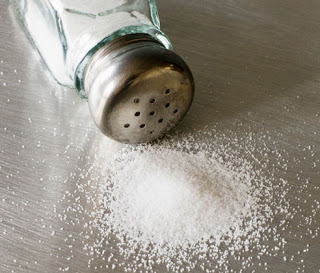 Researchers at Duke University Medical Center along with some Australian scientists have discovered that blocking addiction-related nerve pathways in the brain can have a significant impact on sodium appetite. Basically, the nerve cells and connections affected by addictive drugs are the same as those affected by salt.
Researchers at Duke University Medical Center along with some Australian scientists have discovered that blocking addiction-related nerve pathways in the brain can have a significant impact on sodium appetite. Basically, the nerve cells and connections affected by addictive drugs are the same as those affected by salt.
“Their rodent research shows how certain genes are regulated in a part of the brain that controls the equilibrium of salt, water, energy, reproduction and other rhythms — the hypothalamus. The scientists found that the gene patterns activated by stimulating an instinctive behavior, salt appetite, were the same groups of genes regulated by cocaine or opiate (such as heroin) addiction.”
Researchers provoked this instinctive behavior in mice either by using a diuretic and withholding salt for a period of time or by using the stress hormone ACTH to increase their need for sodium. In doing so, this demonstrated when salt appetite genes were turned on or off and how quickly that switch can be flipped, as it took a mere 10 minutes for mice that drank a salt solution, long before sodium could even be absorbed into their bloodstream.
According to this study, even though such instincts like our hunger for salt are genetically programmed, these neural pathways can be altered through learning and cognition. As such, many scientists believe that addiction works in this same manner.
“Once the genetic program is operating, experiences that are part of the execution of the program become embodied in the overall patterns of an individual’s behavior, and some scientists have theorized that drug addiction may use nerve pathways of instinct. In this study, we have demonstrated that one classic instinct, the hunger for salt, is providing neural organization that subserves addiction to opiates and cocaine” said co-lead author Professor Derek Denton, of the University of Melbourne and the Florey Neuroscience Institute.
Furthermore, the research team discovered that a certain region of the hypothalamus becomes susceptible to the effects of dopamine among animals with a healthy appetite for salt. “That suggests that the state of the instinctive need, the sodium-depleted state, “spring-loads” the hypothalamus for the subjective experience of reward which follows when animals gratify the need — a satisfied feeling.”
Moreover, this instinctual theory of addiction may help to explain why abstinence is so difficult and maintenance approaches such as methadone are much more successful despite physical dependence.
Consequently, these findings could seriously impact the understanding of addiction as well as research and treatment, not to mention the impact on high sodium foods.
Salt Appetite Is Linked to Drug Addiction, Research Finds
© www.understandingaddictions.com
SOURCE: Understanding Addictions – Read entire story here.





